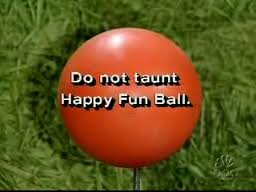Dammit, that acronym gets me every time!
Again, probably because Jason is neither happy nor fun IMO.
It doesn’t matter that the fake product on SNL probably wasn’t either.
Dammit, that acronym gets me every time!
Again, probably because Jason is neither happy nor fun IMO.
It doesn’t matter that the fake product on SNL probably wasn’t either.

…and you can complete that thought by yourselves.
Since you-all are hanging out here anyway, it feels more like we just moved to a nicer apartment complex closer to the park.

I think your attempt at engaging in conversation was unfortunately doomed from the start. Jeff is highly resistant to engaging in discussion about ideas that challenge his concepts of the ideal forms of communication and community. He’s also highly skilled at deflection, using his own authority as the creator of successful software as a way of bulldozing over those who disagree with him. I mean, just look at what happened when he challenged the community on the like limit issue or the slurping GIF.
You ought to have seen his crash and burn in a thread about the Handmaid’s Tale.
Jeff has a bad habit of looking for technological solutions to problems that still require human judgement and soft skills. I finally had the bun with Music Theory and Practice Stack Exchange, and nuked my account. I wasn’t on the bad side of TPTB there - quite the contrary - but I finally ran out of patience with a system that equates mastery with popularity, makes it very difficult to avoid duplicate questions (i.e., by locating existing instances), and insists that crowd sourcing is going to provide the answer to a given problem, with all discussion being ancillary to that answer (and rather dogmatically curtailed).
The problem with that is that fields like software engineering (and music!) do require a deep and subtle understanding to perform well, and solutions to specific problems often involve balancing contradictory requirements, i.e., there’s more than one correct way to skin the cat. Unadulterated Discourse would make a better platform than what they’ve got, because discussion is where the real education occurs. SE is, however, where Jeff’s way of looking at things really manifests itself.
Haven’t seen it, ain’t going back to find out. Synopsis, please?
I so expected that list item to be numbered iii)
Not to speak for someone else, and I’m not sure what the context of that particular statement was, but from my personal observations, the audience does tend to be anti-DRM, anti-tracking, pro-ad-blocker, and many of the comments on the store posts tend to mock the products or ask why they’re again offering a ‘lifetime’ subscription to a service that will likely be defunct in 3 months. It could be difficult to sell that audience to advertisers. Most advertisers prefer mindless drone consumers. But it is the audience that the content is targeting, so not really the audience’s fault.
I’m kind of glad I missed that one. Given his propensity for getting offended that the community wasn’t behaving exactly like he thought it should, I can only imagine it went over like a lead balloon on fire.

I’m kind of curious, myself, but a) I have no desire to go back to bbs, and b) I have no desire to keep face-palming each time he steps in it deeper, as I’m sure I would. Melz is smart and articulate: I’m sure she can give a good account of the action so that I only have to perform a single “Oh Gawd!” face-palm. 
I have to say that this attitude itself, while wholly reasonable and justifiable, was inevitably doomed to help bring about the recent Boingpocalypse. I, too, would greatly prefer they sell genuinely cool and useful and hi-quality stuff. I usually like the Authors’ tastes, and I figure they’re all reasonably smart, and have access to some groovy products that I might never be exposed to otherwise. I often enjoy scrolling through their annual holiday gift guides for that very reason. And their StackSocial wares are, too often, craptaculous.
But their ads and their store and their affiliate links are their revenue stream. Plenty of us block their ads, plenty of us bitch about their affiliate links, plenty of us leap to complain about the shit they sell in the BB Store, which absolutely none of us are under any obligation to spend one centavo of our own money on, however hard-earned or ill-gotten. Can you blame Jason for feeling like the BBS commenters are a drag on the system, are slapping the ice cream cones out of his mouth, are inhibiting the ability of the Boing enterprise to show a profit?
He does a whole lot of things in a manner contrary to what I’d call gracious and well-thought-out, but in this sense he’s not far wrong. In our insistence to say whatever the hell we want about whatever the hell gewgaws they stock their Curiosity Shoppe with to try and pry a few nickels outta the passersby who read the blog, we cost them money.
And that right there cost us a certain degree of respect and sympathy from TPTB, like it or lump it.
No. The solution to that is very simple: don’t sell shit. Boing Boing’s readership is going to be the kind who (quite rightly) object, whether regulars or passing through, and they do, both regulars and “irregulars”.
If you’re going to do retail, sell stuff that your clientele wants to buy. If you are going to sell advertising, know your readership, and present ads that match what your readership wants to buy. (If you know your readership, you can present advertisers with the numbers - it makes sales a lot easier.)
With things like that shitty, deceptive VPN advertorial, BB damages their own reputation by treating their readership with a certain contempt. They are right in line with current business practices that consider the people purchasing the products as consumers rather than customers. If they want business over the long term, though, they had better start cultivating their readers’ custom. Every time they get a bad comment, it means that someone has ceased to take their offerings seriously - BB has failed, not the commentator. Jason’s responses to criticism differ from those asshat companies that sue for bad Amazon reviews only in degree, not in kind.
If you guys say so. Like I said, the opposition to what they were selling is perfectly justified and reasonable. You guys got to make your point. You didn’t endear yourselves to the blog owners by doing so. I’m not saying I was never critical of the place and how it is run, but when it came to the commercial stuff, if I didn’t like it, I ignored it. Caveat emptor everywhere and always, but I had a fair amount of fun for a lot of years over there, and I barely paid for any of that fun. But I also never felt the urge to try and prevent other suckers from helping to keep the BB lights on.
Donald, I never commented on those posts (except for the odd APL comment in the threads attending some of their “Teach yourself programming” packages). I did, however, take close notice of the problems that were aired in the comments (which pretty much matched my assessments of the offerings, but one can always learn…).
A business that tries to play me for a sucker deserves everything it has coming to it, and it ain’t money. “Caveat emptor” is all well and good, but people in general like to see fair dealing, and, in general, they tend to warn people away from shoddy or deceptive offerings. When a business starts to see a lot of those warnings or complaints, it means that they have a problem: if their business model is deceptive, they’re not doing a very good job of deceiving; if their business model was intended to be straight, then they’re making a right cack of reading their market. Either road, complaining about the comments is a waste of time and exacerbates the problem.
Honestly, there are several approaches they might have taken. “Sell quality shit” would be my preferred one. “Disable comments on advertorial posts” would also prevent us opinionated types from poisoning the opinions of would-be buyers who happen to peek at the comments. Not anywhere near my idea of a best practice, but would at least minimize our perceived “toxicity” to advertisers.
But they don’t do that. So we squawk about the shit they sell. Which, again, we are under no obligation to buy. And so Jason develops the opinion that having commenters is bad for business, and for all I know extrapolates that opinion to the point he feels that the BBS itself is a drag on Boing resources, and that those of us who care enough to criticize the products (and register our disappointment that the blog we all came to for high-quality discussion–the blog we all loved and recommended to our friends and families!–has fallen so far as to sell useless wastes of money and insulting garbage) are way, way more trouble than we’re worth.
I haven’t made any kind of rigorous study, and I don’t have any actual idea what the ratio of commercial BB post to negatively critical BBS comment has been. I don’t care nearly enough to make even a half-assed 5-minute survey. All I know is that I’ve seen a hell of a lot of comments ragging the shit they sell, which may have resulted in the laudable consequence of saving some people from foolishly parting with their money, but also has definitely left an enduring impression among TPTB that we’re entitled complainers who like to leave handwritten “don’t buy this, you idiot” Post-It Notes on half the items in BB’s flea market stall, while we enjoy the air conditioning and the conversation and the comfortable seating.
Hey, we got opinions, we’re gonna opine, in an opinionated way. But @LearnedCoward asked. How did TPTB come to regard the BBS readership as toxic to advertisers? That was how.
nope. I can’t. The comments on those were always full of people who were entirely factually correct, and yet utterly in the wrong. I don’t blame him one bit for being difficult with anyone claiming an ownership stake in his thing, telling him he has responsibilities that he didn’t take on or ask for. It is his ice cream stand.
Slapping the ice cream cone out of his hand, well said.
That’s a possible linkage, but I don’t think it’s quite that 1:1 squawk => that opinion. In the little I’ve asked, it seems a lot more nuanced to me than that sort of reactivity. I don’t think someone who is directly insulted by a guest and in so is forced to exercise authority is fairly spoken of as an authoritarian. But now I’m gonna start getting annoyed with the folks who kept pushin’ and nudgin’ and needlin’ for a reaction when they didn’t like the initial response.
There is an element of the 'pocalypse that was people not taking no for an answer, and I temper my memories of the overreactions with the memories of the acting out it was in response to.